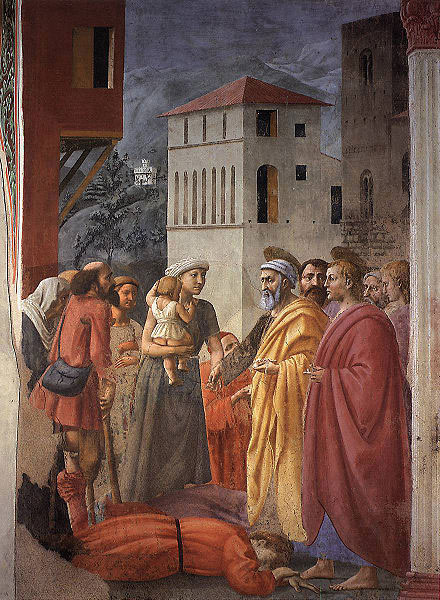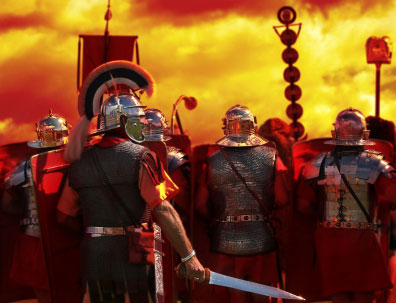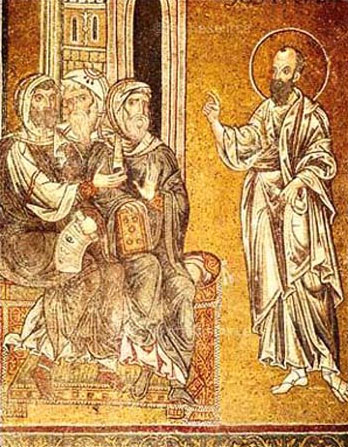Jul
17
2010

But each one is tempted when he is drawn away by his own desires and enticed. Then, when desire has conceived, it gives birth to sin; and sin, when it is full-grown, brings forth death. (James 1:14-15)
The structure of God’s work in the world finds its origin in His trinity: Word, Sacrament, Government (Discipline). Often in the prophets, the man of God is given a sign which is a type of a greater event to come. The prophet is the sacrament that mediates the Word of discipline to the People.
Continue reading
Comments Off | tags: Abraham, Acts, Atonement, Balaam, Communion, Genesis, Isaiah, Jezebel, Judas, Moses, Replacement Theology, Totus Christus, Typology | posted in Biblical Theology, The Last Days
Jul
9
2010

Michael F. Bird recently wrote:
The Jerusalem council achieved a via media by finding in Scripture a justification for the inclusion of Gentiles within the church without requiring circumcision and placing upon Gentiles only the obligation to avoid idol food and sexual immorality. Yet the Jerusalem council also permitted the existence of two parallel theologies: one theology where the Gentiles were uncircumcised equals in a renewed Israel with holiness constituted by the Spirit and another theology where uncircumcised Gentiles were guests in an Israelite remnant that still defined holiness through Torah observance. The Jerusalem council’s decisions seem optimized in a setting where Jewish Christians and Gentile Christians remain in parallel rather than integrated, especially in relation to shared meals. The council did not stipulate the standard of law observance to be upheld for Eucharistic fellowship to ensue.
Bird makes some interesting observations in his post, but two parallel theologies? Is that really what was going on? And does the council’s decision apply to modern observance of the Torah (ie. Messianic Jews)?
Continue reading
Comments Off | tags: AD70, James, Nazirite, Paul, Replacement Theology, Revelation, Tabernacle of David, Tabernacles, Temple | posted in Biblical Theology
Aug
1
2009

Or Rich Jewish Rulers made Poor, Blind and Naked
Or The Bible Teaches Replacement Theology
According to James Jordan, there’s nothing much in Revelation that isn’t also elsewhere in the New Testament. We just don’t get Revelation because we don’t speak the language of the Old Testament with any confidence. Accordingly, his interpretation of the Apocalypse interprets the seven Seals as the release of the gospel. The Trumpets are the warnings of the Apostles to the Jews until the beginning of the Roman siege. [1]
Continue reading
Comments Off | tags: Acts, Dominion Theology, James Jordan, Passover, Paul, Replacement Theology, Revelation | posted in Biblical Theology, The Last Days, Totus Christus
Apr
11
2009
Interpretive Maximalism

Need help combating those pesky liberal scholars who insist the Bible has been cobbled together and is nothing but an archaic shambles? Or those premillennialists who gasp in horror when you mention that the church replaced Israel? You need a strong dose of interpretive maximalism. It cuts liberal scholarship and dispensational nonsense to shreds. How? It shows, using repeated typology, that orthodox preterism and postmillennialism flow naturally out of the Old Testament.
Continue reading
Comments Off | tags: Dispensationalism, James Jordan, Postmillennialism, Preterism, Replacement Theology | posted in Biblical Theology
Apr
10
2009
Did God replace Judaism or merely put it on hold?
Being a Jew was never a matter of bloodline, but of Covenant. Think of Abraham’s servants circumcised in Genesis 17, the Egyptians at the Exodus, Caleb the Kenizzite, Rahab, Ruth, Uriah, etc. It seems the Old Testament keeps throwing us examples of people “grafted in.” The only actual bloodline of any importance is the one we are given, the family tree from Abraham to Christ.
Israel’s captivity and Restoration gave us a perfect picture of the New Covenant events. The Temple and walls of the old Israel were ‘de-created’ and God Himself (the ark) died in Babylon for the sake of a new Jerusalem with impregnable walls.
Christ was the human ark. Judaism, intermarried with Roman political power, became Babylon.
My point is, the captivity was a death-and-resurrection of first century Israel (the resurrection as predicted in Ezekiel 37) in type. The first century was the antitype. Thus, whatever remains of Judaism today is like exhumed idols from the eras of Jeroboam, Ahab*, Omri and Manasseh.
It is not about blood. It never was. It is about Covenant, and there is only one of those. Despite its various death-and-resurrection renewals, there has only ever really been one covenant. There is no replacement of God’s people, only transfiguration from glory to glory.
*Remember it was Jezebel’s daughter Athaliah that almost DID destroy this single bloodline that mattered. Jehoash was the single son who escaped, an echo of Moses and a type of Christ.
6 comments | tags: Abraham, Ahab, Ark of the Covenant, Athaliah, Babylon, Covenant curse, Dispensationalism, Genesis, Jezebel, Joash, Replacement Theology, Resurrection, Ruth | posted in Biblical Theology
Apr
10
2009
“Danger!” the dispensationalist pundits are shouting. “Watch out for replacement theology!” This specter of “replacement theology,” also masquerading under the pseudo-academic moniker “supersessionism,” looms ominously over Christendom. One blogger blogs, “One of the most dangerous and subversive doctrines held by adherents of Preterism, is the view that in A.D. 70, at the destruction of Jerusalem by the Roman armies, God’s covenant nation of Israel was superseded by the Christian church.” A website adds, “There is a demonic cancer coursing through the life blood of the Church of Jesus Christ and its name is REPLACEMENT THEOLOGY.” Yet another puts it bluntly, “This is a heresy . . .” Joel McDermon, Replacing Replacement Theology
Fight terminology with terminology. Throughout the Bible it is clear that God’s priestly nation went through many death-and-resurrection renewals. No one calls those ‘replacements.’ Can you imagine theologians arguing that Ezra’s Temple and Nehemiah’s new Jerusalem were only a temporary parenthesis, and that God would give Israel back their old kingdom?
The same thing exactly happened in the first century. Israel died and was resurrected anew. So, I propose new jargon – ‘Transformation Theology: don’t stay left behind.’
Comments Off | tags: Dispensationalism, Ezra, Nehemiah, Replacement Theology | posted in Biblical Theology, The Last Days, The Restoration Era





























